- Home
- Anne Stuart
Never Marry a Viscount Page 6
Never Marry a Viscount Read online
Page 6
She hadn’t expected the summons to appear upstairs. Oh, to be sure, her father had often called Cook up to the dining room to compliment her on an especially good meal, but this didn’t seem that kind of household, not for such a friendly gesture. She started for the door, ready to follow Dickens, when Prunella stopped her.
“Your apron, miss,” she said, holding out her hand. “And you might want to brush some of the flour off your face. You have to look neat and proper for the quality.”
Sophie controlled her instinctive snort and ripped off the apron and the sleeve protectors, dusting her face with her hands. Her hair was coming loose, but Dickens was impatient and there was no time to fix it, so she scampered up the stairs after the butler, her heart pounding. Was there some sort of problem with the meal? Was she going to be tossed out on her rump?
Dickens pushed the door in the butler’s pantry open and announced in loud, gravelly tones, “Madame Camille, my lord.”
She froze, and Dickens gave her a little push as the majestic woman at the end of the table began to speak. She had small, dark eyes that reminded Sophie of a rodent, and she wanted to squirm in distaste. She stayed still. “Madame Camille, I am so happy you agreed to my entreaties. The meal was quite . . .” Her voice trailed off, and Sophie stood in the middle of the dining hall, the space familiar and yet unfamiliar, as six pairs of eyes stared at her with astonishment.
Oh, bugger, Sophie thought, coming up with the worst curse she knew. They know I’m not Madame Camille, and they’re going to demand who I really am and I’d better come up with a reasonable lie, fast, but who could I be because I’m obviously not a regular servant and what reason would I have for showing up here . . . ?
Finally the lady continued, but there was an assessing look in her eye. “Well, I must say, when I wrote you I didn’t realize you were quite so young. You are not at all what I imagined, Madame Camille. You’ve developed quite a reputation in your short years on earth.”
Bugger, bugger, bugger. She held her breath.
“But I can see why. The meal was magnificent, though the soup was perhaps a bit plain, and I might have wanted a richer sauce for the lamb. But the vol-au-vent swans were a poem, though you should have made more of them.”
In her relief Sophie noticed that the woman’s massive bosom was liberally dusted with the flaky pastry, and could well imagine where the last twelve had gone. This must be the Dark Viscount’s stepmother, Mrs. Griffiths.
She was damned if she was going to curtsey. If they all thought she was some magnificent, famed chef then she would have the self-esteem not to cower. She gave the woman a small bow of acknowledgment. “You are very kind, madame.”
The pretty young woman she’d spied clutching the viscount’s arm earlier was looking at her with undisguised dislike, the young man who resembled her and was most likely her brother was almost drooling, but she’d been in society long enough to understand both of those reactions.
“Yes, indeed, an excellent meal, Madame Camille,” said an unctuous voice, and her eyes went to the older man in the clerical collar. He was new to the living since the Russells had owned Renwick, and thank God he’d considered himself too important to make calls on the lesser members of his congregation, such as a retired nanny and her temporary wards. There was no chance he’d recognize her.
She hadn’t yet looked at the head of the table, and the lord of the manor was silent. Maybe she could simply thank them and back out of the room before things got complicated.
“A dream,” trilled the woman across from the vicar, clearly his wife.
And then he spoke, his deep, slightly cynical voice sending peculiar sensations down her spine. “Yes, indeed, Madame Camille,” Viscount Griffiths said. “You more than exceeded our expectations. We all look forward to seeing what else you might be capable of.”
She turned to him. She had no choice, and she met his cool, saturnine gaze across the table. “Thank you, my lord.” Maybe she ought to say she was honored, but she wasn’t going to do it. There were limits to how much she was willing to grovel, and her meal had been wonderful.
“Particularly on such short notice,” said the pretty female, not as pretty with that sour expression on her face. “You just arrived, did you not?”
“I did, my lady.” It was a stab in the dark, but the woman held herself like someone with a title and a stick up her arse.
“Well, you’ll be kept quite busy in the kitchen, I imagine,” the woman continued, and Sophie knew she’d guessed right. It was a good thing she’d never run into this particular female in society or she’d be in deep trouble. “We shan’t be likely to see you abovestairs again.”
“I believe you’re incorrect, Lady Christabel,” the viscount overrode her. “I will wish to approve her menus, as my stepmother is too prostrate with grief to attend to such mundane details. But the time I spend closeted with my new . . . cook should be of no concern to you.”
The woman’s face flamed, and Sophie was at a loss to understand why, any more than she could guess the meaning of his hesitation before calling her his cook. Was he suggesting she was anything more than that? She would soon set him straight on that particular detail. In some households the sexual favors of female servants were a foregone conclusion, but such had never been the case at Renwick when they’d owned it, and she wasn’t going to let it happen now. With no housekeeper, she was the senior female servant, and she was damned if she was going to let him have his lecherous way with anyone, including herself.
Though he didn’t look particularly lecherous. He was watching with that same dark stillness, lightened by the faint trace of amusement, as if he found the entire situation funny. Sophie could see no possible sign of humor in it, and she wondered if the man was slightly mad. That would explain why he killed his wife, but what else would it explain?
Except that he wasn’t mad—she knew that perfectly well. He simply didn’t care what anyone at the table thought, which was almost more shocking than madness itself.
“You’re dismissed, Madame Camille,” he said, watching her with that odd light in his eyes. “But I shall wish to confer with you as soon as possible. Tonight might be difficult, but by tomorrow my guests will make their inevitable departure and you’ll be more rested.”
There was an immediate babble of protest. Mrs. Griffiths announced her ability to monitor the menus in a tone far different from her previous failing accents; the young man was asserting that he and his sister weren’t demanded elsewhere at the moment; the young woman was whining to the viscount; the vicar was looking across at his wife with a certain resignation; and Sophie wanted to clap her hands over her ears and scream for them all to be quiet.
Alexander Griffiths’s voice silenced everyone. “You must look to your health in this time of grief, Mama,” he said, and there was no missing the cynicism in his voice. “And Lady Christabel, you and your brother have been too generous in keeping us company in this house of mourning, but I know you’ll be relieved to be on your way.”
“No such thing, my lord,” Lady Christabel said with a false laugh. “I wish to provide succor to you in this time of need.”
Alexander Griffiths let his slow, insolent gaze slide down Lady Christabel’s fashionably flat front, then lifted his lids to look at Sophie’s more generous curves. No one in the room could miss such a blatant, wordless insult.
Lady Christabel’s face turned crimson, her brother began to bluster, and even Sophie could feel the heat rise in her cheeks.
There was nothing she could do, and her presence only made the situation worse. “If you’ll excuse me, Mrs. Griffiths, my lord, I still have work to see to.” Before anyone could grant her permission, she simply slipped past Dickens’s back, through the butler’s pantry, and down the curving stairs into the kitchens.
She hadn’t been upstairs that long, but the place was already spotless. Prunella met her as she reached the bottom of the stairs and led her into the kitchen. The staff met her with a round
of enthusiastic applause, and for a moment Sophie felt almost tearful. The fulsome compliments of those idiots upstairs meant nothing. This was the real tribute.
She applauded them in return, and Prunella brought her to the table, where a blessedly fresh pot of tea and the final two vol-au-vent swans awaited her. “You’ve done a right fine job, miss,” Prunella said heartily. “We all agree, and we’ll follow you wherever you lead us. Not to worry about any trouble from hereabouts. We’ll be more than happy to see you safe.”
Sophie was sinking gratefully into the chair—her feet and her back were suddenly aching, now that the excitement had died down, and she looked up into Prunella’s eyes. What was this now? First the viscount making odd suggestions, and now the kitchen staff was hinting at knowledge they could not have. Not a single one of them was from the area; none of them had ever worked in the house during the thirty years the Russell family had been in residence. No one could know.
She had no choice but to let it go. She was far too weary to figure it out. She hadn’t even had time to unpack, and right now all she wanted was a hot bath and the chance to crawl into bed. “You are all very kind,” she said, and this time she meant it.
Dickens had reappeared. “The party has disbanded, and there will be no need to bring tea and coffee for the ladies, nor port for the gentlemen. I can say with certainty that the Lady Christabel and Lord Frederic will be leaving in the morning, which means Mrs. Griffiths will soon go back to having a tray in her room and our meals should be a great deal simpler. Thank you, Madame Camille, for a truly inspired dinner. The rest of you, you’re finished for the evening.”
Sophie had taken her first sip of the tea, perfectly brewed, as she listened to Dickens. The rest of them were finished for the evening? What did that mean for her?
Dickens waited until the last of the staff departed, even giving Prunella a meaningful eye as she hovered protectively.
“You don’t have to do anything you don’t want to do,” Prunella announced stubbornly as she headed for the stairs that would lead her up to the attics. “And don’t let Mr. Dickens tell you anything different.”
Sophie braced herself. What next, she thought wearily.
Dickens waited until Prunella disappeared. “His lordship wishes to see you in the library at half past eleven.” The butler made it sound like the voice of God had decreed it.
“I don’t think so.” She drained her tea, then poured herself another cup.
“I will show you—I beg your pardon?” Dickens blinked at her and her arrant blasphemy.
She took another sip from the tea, then reached for one of the swans. “I said I don’t think so. I am weary, and I intend to go straight to my bed once I finish my tea. I expect tomorrow will be a long day, and I have no intention of lengthening this one.”
“But his lordship—”
“Can go hang,” Sophie said ruthlessly.
“Madame Camille!”
“Mr. Dickens,” she replied in a civil tone. “Please tell his lordship that I’ll be happy to wait on him in the morning at any time he requires. But right now I need my rest.”
Dickens didn’t look happy, but he knew an unshakable decision when he heard it. “Yes, madame,” he said.
She felt a smile curve her mouth. “Come along, Mr. Dickens, how bad will it be? It’s not your fault I’m being a recalcitrant female—he won’t blame you.”
The butler didn’t appear any too certain of that fact. “Yes, madame,” he said again. “We usually put out breakfast at nine in the morning, but with the Forresters leaving we might provide earlier trays. I doubt they’ll want to sit at table with his lordship again.”
“It got that much worse after I left?” she said sympathetically.
“Immeasurably,” said Dickens. “I’ll go and give your reply to his lordship, though perhaps I’ll be more diplomatic. My rooms are on this floor as well, though at the far end past the stillroom, the plate room, and the cheese room. If you need anything you have only to ask.”
“Thank you, Mr. Dickens. You’ve been very kind. And please don’t blame Prunella for looking out for me. She was only being kind.”
It was a mere guess, but Dickens’s expression verified it. There was something rather sweet going on between the cook’s right hand and the burly butler. “Miss Prunella is a very kind woman.”
“She is indeed. Good night, Mr. Dickens.”
“Good night, madame.”
She watched him go, then took her dishes to the scullery and washed them. She didn’t need to—most kitchen workers would have left them for the scullery maids to deal with in the morning, but they’d all worked so hard, Sophie had no intention of leaving them with any more work.
It had been the longest, most eventful day of her life. Tomorrow couldn’t help but be easier.
The cook’s quarters were luxurious by servants’ standards. There was a small sitting room with cast-off furniture, a bedroom with a nice, large bed, and even a bathing room and water closet. She remembered something about Bryony insisting the servants needed bathing facilities and their father protesting it was a waste of money in a house they didn’t even own, but right now she could bless Bryony’s stubbornness. The tub was deep and the hot water abundant, and she slipped into it with a sigh of relief as every muscle in her body began to relax and her mind ran past the events of the day. She would need to get word to Nanny, somehow, without the interfering Miss Crowell becoming involved. She also needed to understand the Dark Viscount’s cryptic statements about the employment agent, Mrs. Lefton, and what was expected from her. She should have gone with Dickens to meet with the viscount. After all, he was her employer, and normally she would work on menus with whomever was in charge—usually the housekeeper and lady of the house.
But there was no housekeeper, and the mistress, Alexander Griffiths’s stepmother, was apparently prostrate with grief, though not so prostrate she couldn’t devour an astonishing number of vol-au-vent swans. A midnight meeting with his lordship was therefore logical.
But she didn’t want to do it. She leaned back in the tub and closed her eyes. Seeing him close up had been a shock. The man was mesmerizing, with his dark gray eyes lit with just a trace of wicked humor, the high cheekbones and narrow nose and, oh my God, his mouth. She was obsessed with his mouth, with its faintly mocking curve. And she didn’t even want to think about the lean, powerful body up close.
She slid lower into the tub with a moan. What was wrong with her? There’d been a score of men falling at her feet, plain men, handsome men, even a couple of too-exquisitely beautiful men who could have made her life a complete misery. She hadn’t wanted any of them—they’d been playthings to tease and set against each other.
Now that she could no longer have any man she wanted, she suddenly wanted one. It was a shocking thought, and she wished she could deny it, but the more she tried to talk herself out of it, the worse it got, and she finally gave up.
“So he’s pretty,” she said out loud. “So you’re obsessed with him, and have been for weeks. What else have you got to be obsessed with? He’s the first good-looking man of quality you’ve been around in months, and he has all that romantic, broody stuff going on, with the long hair and the fascinating eyes. You’re just bored. In London you wouldn’t look twice.”
But she would, and she knew it. He was the kind of man who drew the eye, and that secret twist of humor kept her attention focused. So what? During the long hours of dinner preparations Prunella had talked, of course, answering her questions about the household and its ways with a low voice. Apparently the viscount didn’t touch the staff, even the prettiest, youngest ones, and he made certain no one else did. Which meant she was safe from importunate male attention, particularly from the master of the house.
Such a relief, she thought, grimacing. It would certainly keep things simpler, knowing he had no intention of pressing advances on her. Knowing he’d never touch her with the long, elegant hands she’d noticed at the dinner table
while the argument railed around her. Knowing she’d never feel all that golden skin against hers, nor the touch of his mouth. She wouldn’t wipe the cynicism from his eyes and the sarcastic bent from his speech. She would cook for him, and discover just where all this money had come from, and whether he’d been in London or had any confederates connected to Russell Shipping. And then she’d leave. Once she had a place to go.
Right now Nanny Gruen’s cottage was empty, her sisters were God knew where, and she was on her own. She pulled on the lace nightdress she’d managed to sneak out under her petticoats when they’d been summarily evicted from their town house, and climbed into the cool, clean-smelling sheets. She could probably thank Prunella for that. It wasn’t a warm night, but there were plenty of quilts and blankets on the bed, and she moved to open one of the high-set windows just a bit, to let the scent of the night air into the room. Odd, but she’d always thought she’d hated being outdoors. It turned out she simply disliked parading around in a crowded public park. She loved the wild expanses around this house, and she’d spent years not realizing it.
She slid into bed with a sigh of relief. Renwick had never been Sophie’s favorite place in the world, though her sisters had adored it. She’d preferred the excitement of town life. But now, being in London was the very last thing she wanted, not because of the shame her father had brought down on them all, but simply because she’d feel stifled. She breathed in the smell of the countryside, slowly, evenly, as she drifted into sleep. And if the last thing she thought of was Alexander Griffiths’s beautiful hands, no one had to know.
Alexander leaned back in the leather chair, a glass of Scots whisky cradled in his hands, and controlled his urge to strangle someone. What the hell was going on in his household? These matters were supposed to be very simple, and instead it was growing more and more complicated.

 Ice Blue
Ice Blue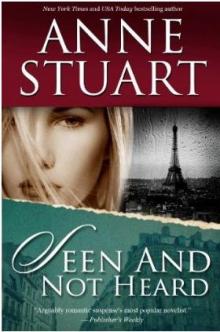 Seen and Not Heard
Seen and Not Heard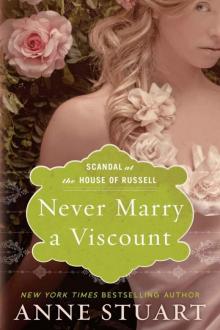 Never Marry a Viscount
Never Marry a Viscount Heartless
Heartless The Devil's Waltz
The Devil's Waltz Hidden Honor
Hidden Honor Silver Falls
Silver Falls Fire and Ice
Fire and Ice Nightfall
Nightfall Never Trust a Pirate
Never Trust a Pirate The Soldier and the Baby
The Soldier and the Baby Still Lake
Still Lake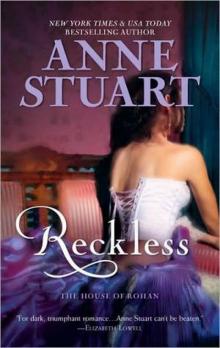 Reckless
Reckless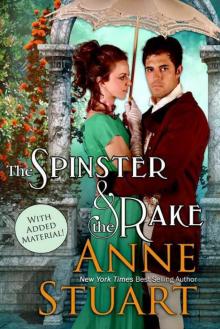 The Spinster and the Rake
The Spinster and the Rake Winter's Edge
Winter's Edge At the Edge of the Sun
At the Edge of the Sun Into the Fire
Into the Fire Night of the Phantom
Night of the Phantom Ritual Sins
Ritual Sins Darkness Before the Dawn
Darkness Before the Dawn Against the Wind
Against the Wind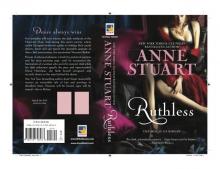 Ruthless
Ruthless The Catspaw Collection
The Catspaw Collection Escape Out of Darkness
Escape Out of Darkness The Widow
The Widow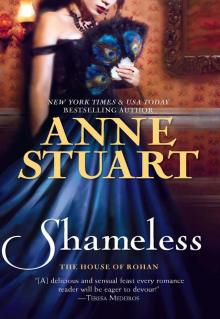 Shameless
Shameless Black Ice
Black Ice Breathless
Breathless Shadows at Sunset
Shadows at Sunset Falling Angel
Falling Angel Housebound
Housebound Cold as Ice
Cold as Ice The Wicked House of Rohan
The Wicked House of Rohan Lord of Danger
Lord of Danger The High Sheriff of Huntingdon
The High Sheriff of Huntingdon Wildfire
Wildfire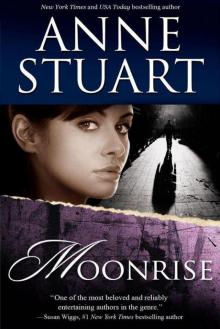 Moonrise
Moonrise The Demon Count's Daughter
The Demon Count's Daughter Date With a Devil
Date With a Devil To Love a Dark Lord
To Love a Dark Lord Driven by Fire
Driven by Fire Special Gifts
Special Gifts Ice Storm
Ice Storm Shadow Lover
Shadow Lover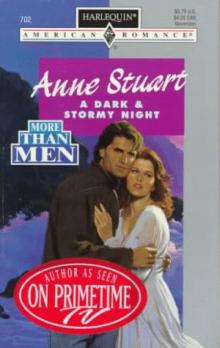 A Dark & Stormy Night
A Dark & Stormy Night Now You See Him...
Now You See Him...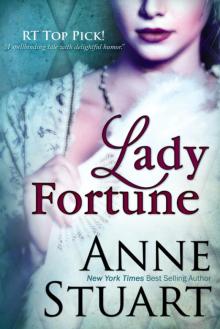 Lady Fortune
Lady Fortune Glass Houses
Glass Houses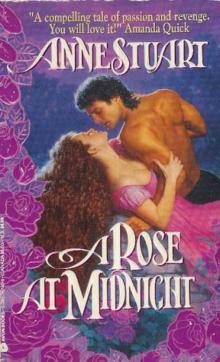 A Rose at Midnight
A Rose at Midnight Prince of Swords
Prince of Swords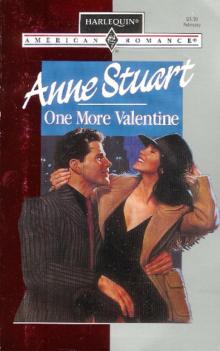 One More Valentine
One More Valentine Return to Christmas
Return to Christmas Tangled Lies
Tangled Lies Consumed by Fire
Consumed by Fire The Fall of Maggie Brown
The Fall of Maggie Brown Wild Thing
Wild Thing Crazy Like a Fox
Crazy Like a Fox The Demon Count
The Demon Count Prince of Magic
Prince of Magic Wildfire (The Fire Series Book 3)
Wildfire (The Fire Series Book 3)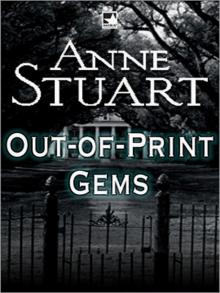 Anne Stuart's Out-of-Print Gems
Anne Stuart's Out-of-Print Gems Shadow Dance
Shadow Dance Under an Enchantment: A Novella
Under an Enchantment: A Novella Demonwood
Demonwood Blue Sage (Anne Stuart's Greatest Hits Book 3)
Blue Sage (Anne Stuart's Greatest Hits Book 3)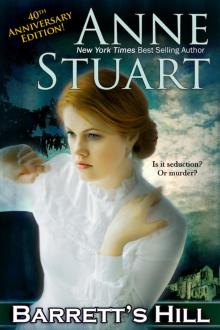 Barrett's Hill
Barrett's Hill Angel's Wings (Anne Stuart's Bad Boys Book 5)
Angel's Wings (Anne Stuart's Bad Boys Book 5) Darkness Before Dawn
Darkness Before Dawn The Right Man
The Right Man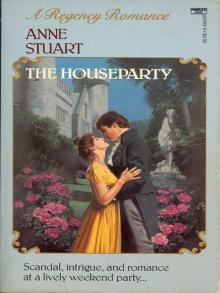 The Houseparty
The Houseparty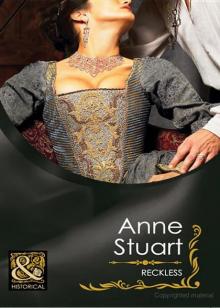 Reckless_Mills & Boon Historical
Reckless_Mills & Boon Historical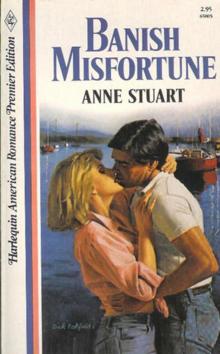 Banish Misfortune
Banish Misfortune Angel's Wings
Angel's Wings Chain of Love
Chain of Love Consumed by Fire (The Fire Series)
Consumed by Fire (The Fire Series) Partners in Crime (Anne Stuart's Bad Boys Book 4)
Partners in Crime (Anne Stuart's Bad Boys Book 4) The Soldier, The Nun and The Baby (Anne Stuart's Greatest Hits Book 2)
The Soldier, The Nun and The Baby (Anne Stuart's Greatest Hits Book 2)